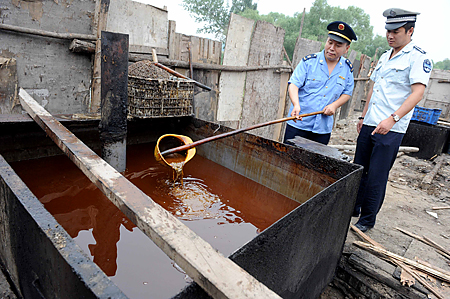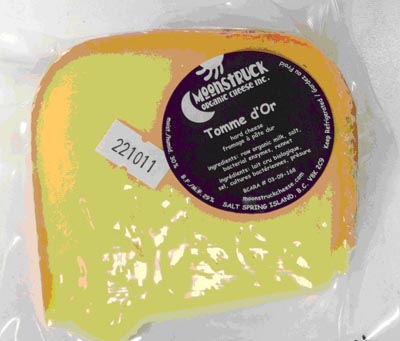A couple of our Alaskan food safety friends sent along updates on the ban food safety regulation movement in the state legislature that looks more like a Second City improv skit.
The Mudflats blog reports Alaska State Rep. Tammie Wilson, a Republican from North Pole, who has taken her quest for deregulation to new and unsanitary heights.
Behold House Bill 202 – Sale of Food by Processors to Consumers. Gone are the days of food inspectors, rules and regulations, requirements for refrigeration, and soap and water. All’s fair at the farmer’s market, no matter what you’re selling.
Most of Rep. Wilson’s testimony came in the form of a skit where the plot focused only on produce and baked goods. She played a beleaguered farmer, just trying to sell her humble wares at the market, and her  aide played an uptight, joyless, and unreasonable inspector from the Department of Environmental Conservation (DEC).
aide played an uptight, joyless, and unreasonable inspector from the Department of Environmental Conservation (DEC).
The ensuing skit involved a lot of food props, and the committee members had also been given samples of peeled and sliced fruit, and cookies. “I do have a knife,” Wilson demonstrated to the audience, “and I will not use it on anyone, I promise.” (Cue a weirdly awkward moment as Wilson’s aide let forth with a too-loud cackle, and the rest of the room sat in uncomfortable silence).
And thus began the dramatic demonstration. Slicing of tomatoes was not allowed, because that was considered “food preparation.” Orange peeling was forbidden for the same reason. Next, she tried “an apple…one that we know daycares like to do. And I’m sure that they’re able, with no permit or anything, to be able to cut an apple for a snack.” No dice, says the inspector, “And as far as a daycare goes, if you have five or less children, you may cut. Any more than that, you’d be permitted.” (Remember this part for later, because it’s not true).
But we’re not done yet. Next up – a strawberry. Wilson begins to remove the green top.
“This may have seemed ridiculous, but you know, it is ridiculous! Do I want to poison anybody? It’s not a good thing to be a Representative and poison your constituents. I just want to put that on the record.”
The TV cameras were rolling, but there was no audio hookup yet. This happens so people don’t embarrass themselves by saying something stupid into a “hot mic” that they weren’t intending to say in public. In this particular case, that didn’t matter. Behold our food-prepping farmer, who beautifully illustrates the hazards of her own bill during the ten minutes before the meeting started:
Who could object to dirty cutlery, snotty carrots, unrefrigerated egg custard, and the underside of Tammy Wilson’s germy fingernails in their strawberries? Ridiculous. As long as there was no willful attempt to poison, that should be enough.
Kristin Ryan, Director for the DEC, identified the Food Safety and Sanitation program as “the main target of Rep. Wilson’s bill” and began her testimony by stating what really should be the obvious:
“The DEC recognizes the interest from small food business owners throughout the state to sell products. Provisions in HB202 could cause significant risks for the general public, and increase foodborne illness  outbreaks.
outbreaks.
When you purchase food to eat, you assume it is safe. While no one intends to harm their customers, food-borne illnesses are common, and can easily happen. Precautionary measures are important to make and serve safe food. At a minimum, you need a sanitary environment, employees to wash their hands, and proper temperature control.”
The Republican bill would eliminate the ability of the DEC to investigate if an outbreak of food-borne illness was occurring. The agency would not be allowed to inspect, test, or stop the sale of a food product that is making people sick.
Because Republicans love freedom. And food safety inspectors don’t.
 "Gutter oil" is made by taking used up cooking oil, often left over from restaurants, along with spent animal fat, and reprocessing it into edible oil to be sold to restaurants.
"Gutter oil" is made by taking used up cooking oil, often left over from restaurants, along with spent animal fat, and reprocessing it into edible oil to be sold to restaurants.
.jpg)
 Affected products include all lot numbers of Tomme d’Or cheese. In order to ensure the health and safety of consumers, a photo of the product is provided below so the public can easily identify the product. The manufacturer is fully cooperating and assisting with the investigation.
Affected products include all lot numbers of Tomme d’Or cheese. In order to ensure the health and safety of consumers, a photo of the product is provided below so the public can easily identify the product. The manufacturer is fully cooperating and assisting with the investigation. Currently there are no illnesses linked to this product.
Currently there are no illnesses linked to this product. Director of the Centre for Disease Control, Dr Vicki Krause, said this is more than twice the number of expected gastroenteritis cases this year caused by the Cryptosporidium parasite.
Director of the Centre for Disease Control, Dr Vicki Krause, said this is more than twice the number of expected gastroenteritis cases this year caused by the Cryptosporidium parasite. movie is about me, or us).
movie is about me, or us).
 animals, or with runoff from animal production facilities, or by improperly cleaned growing or processing equipment. Seeds also might become contaminated during harvesting, distribution, or storage. Many clover seeds are produced for agricultural use, so they might not be processed, handled, and stored as human food would. Conditions suitable for sprouting the seed also permit bacteria that might be present on seeds to grow and multiply rapidly.
animals, or with runoff from animal production facilities, or by improperly cleaned growing or processing equipment. Seeds also might become contaminated during harvesting, distribution, or storage. Many clover seeds are produced for agricultural use, so they might not be processed, handled, and stored as human food would. Conditions suitable for sprouting the seed also permit bacteria that might be present on seeds to grow and multiply rapidly. aide played an uptight, joyless, and unreasonable inspector from the Department of Environmental Conservation (DEC).
aide played an uptight, joyless, and unreasonable inspector from the Department of Environmental Conservation (DEC). outbreaks.
outbreaks. anybody can handle blowfish even without a license," said Hashimoto, a blowfish chef for some 30 years.
anybody can handle blowfish even without a license," said Hashimoto, a blowfish chef for some 30 years. the likely culprits that passed on the bacteria.
the likely culprits that passed on the bacteria.